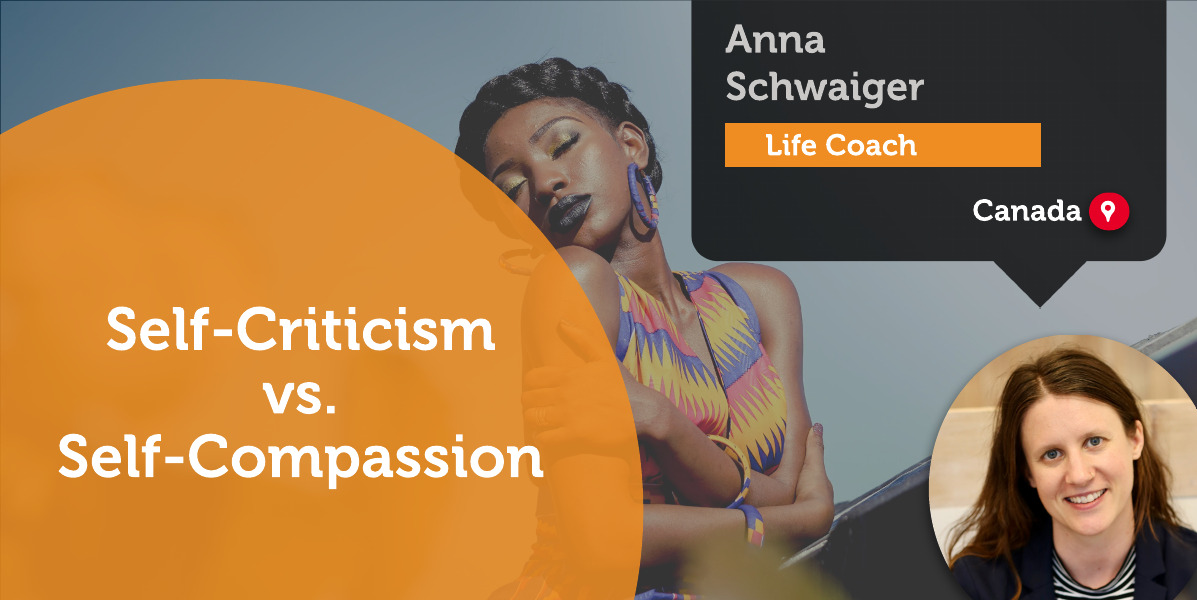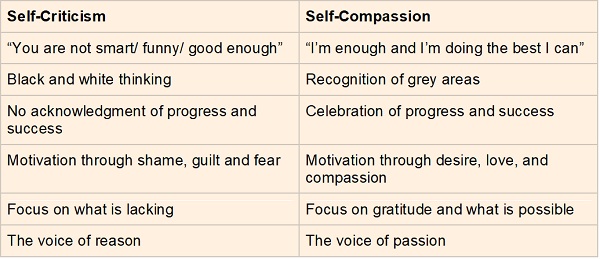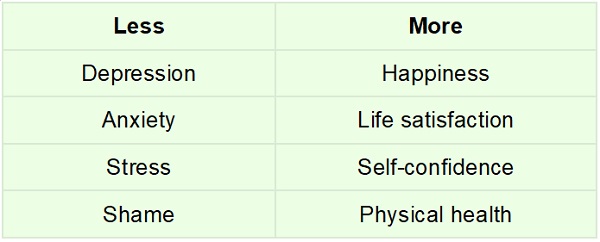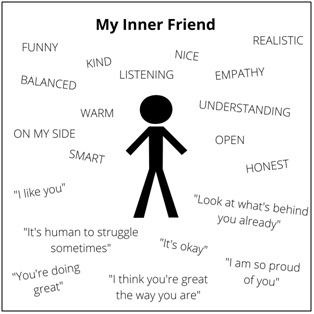A Coaching Power Tool By Anna Schwaiger, Life Coach, CANADA

Let Go of Self-Criticism vs. Self-Compassion
The power tool “Self-criticism vs. Self-compassion” helps clients overcome challenges by treating themselves with respect and kindness instead of negative self-talk and doubt. Self-criticism makes us freeze and doubt our abilities, while self-compassion makes us feel good about ourselves and gives us the power for change.
Remember, you have been criticizing yourself for years and it hasn’t worked. Try approving of yourself and see what happens. You Can Heal Your Life, Louise L. Hay
How do we react if a friend doesn’t get her dream job and beats herself up because of it?
“Don’t worry about it. It was just not the right fit.”
“Forget it, that company sucks anyways!”, or
“You will find a better opportunity very soon.”
We are there for our friend; we listen, care, and try to make her feel better.
What do we tell ourselves if the same happens to us?
“Of course, you didn’t get the job, look at you! You have no experience, are not good enough, and we’re sweating too much during the interview. Who would want to hire you?”
And there it is again – the critical inner voice.
Occasional self-doubt is generally considered to be a normal part of life, but chronic or excessive self-criticism may contribute to mental health concerns, such as depression, social anxiety, body image issues, or feelings of worthlessness. A tendency to blame oneself when things go wrong may lead to feelings of failure, lowness, or a depressed mood. Individuals who are highly self-critical may also feel guilty or ashamed when something goes wrong, believing the fault lies with them. Self-critical tendencies can also be linked with perfectionism, self-harm, and eating and food issues. Goodtherapy.org
Every one of us has a critical inner voice, for some louder than for others. It shows up uninvited, sometimes unexpected, and we are hardly ever happy to hear it. “Don’t say that; you are making a fool of yourself,” “Are you serious? Do you believe that YOU can do that?”, “Be careful, what might she think about you?”, “If he ever finds out about that, he will reject you; he will hate you!”, “You’re stupid!”
“You are not enough!”
It’s this inner part of ourselves that lets us doubt our actions, and that makes us freeze. It makes us feel ashamed, not worthy, small, and it tries to steal our energy. If we imagine that this was a person we knew, we could say with 100% certainty that this person is toxic and that they would never be a friend of ours. But the problem is… this is a part of ourselves. We can’t just get rid of it as we get rid of an old pair of shoes. We can try to ignore it, try to ban it to the very back of our minds, but it’s still there. And it will show up again.
So, what can we do against a self-critical voice that has become too loud and taken over?
Self-compassion involves treating yourself the way you would treat a friend who is having a hard time – even if your friend blew it or is feeling inadequate, or is just facing a tough life challenge. Western culture places great emphasis on being kind to our friends, family, and neighbors who are struggling. Not so when it comes to ourselves. Self-compassion is a practice in which we learn to be a good friend to ourselves when we need it most – to become an inner ally rather than an inner enemy. The Mindful Self-Compassion Workbook – Kristin Neff, PhD, Christopher Germe, PhD
According to Kristin Neff and Christopher Germer,
self-compassion emerges from the heart of mindfulness, when we meet suffering in our lives. Mindfulness invites us to open to suffering with loving, spacious awareness.” It means treating ourselves with kindness and compassion, especially when going through hard times. It means taking a break to feel what’s going on right now, to accept the pain, struggle and emotions and ask ourselves, “how can I support and care for myself right now?
Now, if we think back to the example at the beginning: How would we treat ourselves after an unsuccessful job interview if we feel disappointed, ashamed, or like a failure? Instead of letting the inner critic show up as an automatic response, we could take a break instead, accept the challenging feeling that’s there, and ask ourselves what it is we need right now. It could be talking to a friend, crying, taking a hot bath, going for a walk, or whatever feels comforting at this moment.
We have to understand that the meaning behind what our critical inner self is telling us is most often not the truth.
“You’re a failure” could mean “I’m scared to be hurt.”
“You can’t do anything right” could mean “I am afraid of rejection.”
“You are not good enough” could mean “I feel ashamed.”
Self-criticism usually makes us feel bad about ourselves, and it holds us in the role of the victim who is powerless to change their situation. On the other hand, self-compassion makes us feel good about ourselves and gives us power for action and change.

Self-Criticism vs. Self-Compassion Self application
Imagine waking tomorrow morning, and your self-critical voice has disappeared overnight. No more nagging, judging, or making you feel small or worthless. Instead, you’re full of love, trust, and acceptance for yourself. What will become possible? What doors will suddenly open up? How will you feel differently? How will your relationships change?
Increasing self-compassion has a huge potential for more lightness, ease, and joy in life. There are more and more studies that show how self-compassion brings greater well-being:

Self-Compassion Exercises
Here are some exercises on being a friend for yourself, bringing more self-compassion into your life, improving your well-being, and reducing self-criticism.
How Would I Treat a Friend?
- Think of the last time a friend of yours was struggling. How were you there for your friend? What did you say, how did you behave?
- Now think of the last time you had a similar challenge. How did you respond to your struggles? What did you say, how did you behave?
- Are there any differences in how you treat your friend and how you treat yourself?
- How would you like to treat yourself next time you’re struggling?
Create Your Inner Friend
- Take a piece of paper and draw a stick figure – your inner friend – in the middle.
- Write down all the qualities you appreciate about your friends and yourself.
- Now, imagine what you would like your friend to say if you’re in a challenging situation, and write it down.
- Whenever you’re struggling and in need of a friend, take this paper and read through what your inner friend has to tell you.

Self-Compassion Exercise
At the end of each day, take a moment to answer one, some, or all of the questions below:
- What went well today?
- What am I proud of myself for today?
- What did I do that needed courage?
- Where do I need to show myself more kindness?
Being a Friend for Your Inner Critic
This exercise can help you find self-compassion by visualizing your inner critic.
- Think about something you would typically hear while criticizing yourself, like, “you’re not a good mum,” or “you’re not smart enough”.
- Now imagine who or what is sitting inside of you telling you that. What does he/she/it look and sound like? Is it a person, a thing, a gremlin, a nag? Does it have a name? Try to visualize it with as much detail as possible.
- Next, start a conversation with your inner critic and see how it reacts. You can ask, “Why are you here?” or “What do you need from me?”
- Be aware that you are talking to the most vulnerable part of yourself and that you have to be extra careful and compassionate not to scare it away. Having this inner conversation allows you to look deeply into your own needs, and you may even open the door a little bit to your unconscious self. For many of us, it’s hard to show ourselves the same compassion we let other people experience. By seeing our most vulnerable part as something else, a gremlin, a critical little creature, an inner voice, we can trick our mind into thinking that this little thing deserves our compassion and care. And by feeling empathy for the gremlin, we are being compassionate to ourselves.
Self-Criticism vs. Self-Compassion Coaching Process
In the coaching process, the client will go through the following process:
- Awareness of critical inner self, self-criticism, and negative self-talk
- Connecting with the emotions around self-criticism
- Accepting and understanding the purpose of the inner critic
- Learning how to be a friend for themselves, practicing self-compassion and kindness instead of negative self-talk
Reframing is helpful for clients that don’t have a lot of awareness of their negative self-talk yet. It gives them the opportunity of seeing themselves in a different light and from a different perspective:
Client: “I’m so stupid; I don’t know how to deal with that.”
Coach: “It sounds like this is a very challenging situation, and you’re trying your best to solve it right now. What’s coming up for you if you hear that?”
Emotion-questions let the client get in touch with their emotions and inner voices to find out and feel what’s happening inside them. We give the emotions a voice and let them speak to increase feelings of self-compassion and self-love.
- Where does the emotion sit in your body? What does it look like?
- What do you think is the purpose of this emotion?
- If you listen closely, what is your anxiety/ fear/ anger… telling you?
- What does the anxious/ scared/ angry part inside of you need from you?
Inner-voice-questions are a great way to connect clients to their critical inner selves. By gaining awareness of their inner critic, they will also increase self-compassion and self-love.
- What or who is telling you that it has to be that way/ that you should do that?
- How do you know that this is true?
- What would your critical inner voice need right now to be quieter?
- What would you like to tell you are critical inner voice?
Celebrating-success questions make the client realize what they’ve achieved already. In addition, they increase feelings of self-worth and inner strength.
- How are you feeling about what you’ve achieved?
- How would you like to celebrate your success?
Self-acknowledgment questions make the client realize how much they appreciate themselves and if there is a lack of self-appreciation.
- What do you value most about yourself? What do others value most about you?
- What are you most proud of?
- How would you like to show yourself more appreciation?
Flip-It questions make the client see their issue from a different angle and perspective:
- What would it look like if you treated yourself with self-compassion instead of self-criticism right now?
- How could being self-compassionate instead of self-critical be helpful for you?
- What would a really good friend tell you right now? How would you be there for a friend in the same situation?
Action questions guide the client from reflection to action. “Without taking some action, we are at risk of becoming immobilized in our shame; cue disconnection, isolation, overeating, anger, yelling and more.” (greenlifepsychology.com)
- What are some steps you can take now? What else?
- What support will you need?
- What will you need to feel safe for those next steps?
- What does your inner critic/ anxiety/ anger… need to be quieter right now?
Self-Criticism vs. Self-Compassion Challenges
Challenges, suffering, and frustration are part of human life. We can’t always influence what’s happening around us, but we can heavily influence how we see the world, how we think and feel about what’s happening to us. We can go through life with tinted glasses that show us our deficits and everything that’s not working, OR we put glasses on that show us what is working well and why we are valuable human beings the way we are.
Self-compassionate people recognize that being imperfect, failing, and experiencing life difficulties is inevitable, so they tend to be gentle with themselves when confronted with painful experiences rather than getting angry when life falls short of set ideals. People cannot always be or get exactly what they want. When this reality is denied or fought against suffering increases in the form of stress, frustration and self-criticism. When this reality is accepted with sympathy and kindness, greater emotional equanimity is experienced. self-compassion.org
So next time you hear your critical inner gremlin shouting, making you small, making you feel bad about yourself – take a moment to relax. Breathe. Imagine the little creature sitting inside of you with all its heavy emotions and insecurities, fear and shame. And then ask it calmly, “What is it you need right now?” Listen closely to what your inner critical voice has to say and be the friend it has been looking for its whole life.
References
The Mindful Self-Compassion Workbook - Kristin Neff, Ph.D., Christopher Germe, PhD
You Can Heal Your Life - Louise L. Hay
https://greenlifepsychology.com/what-is-the-inner-critic/
https://self-compassion.org/
https://www.goodtherapy.org/learn-about-therapy/issues/self-criticism